In the UK energy sector, compressed air is the fourth utility. It is as fundamental as electricity, natural gas, and water. In this guide, we break down how compressed air powers the UK energy sector and what you need to keep your systems efficient, compliant, and reliable.
A failure in your compressed air system can trigger costly downtime and impact grid stability, whether at the National Gas compressor station in Peterborough or the safety-critical Sizewell nuclear power complex.
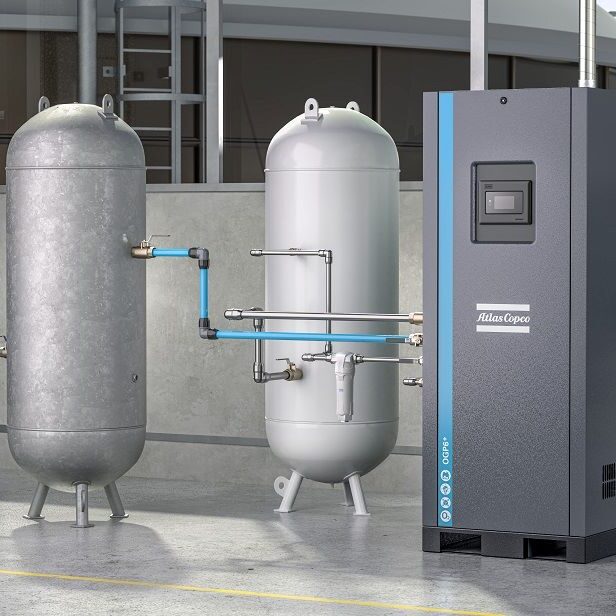
The Core Challenges: Uptime, Cost, and Compliance
What are the most significant pressures facing UK energy operators? From Spalding’s gas-fired plants to offshore wind projects in the East of England, we see the same three challenges on sites across the Midlands and East Anglia.
- The Cost of Uptime: Power generation cannot afford to stop, for even brief periods. Unplanned downtime results in significant financial losses, penalties, lost income, and the cost of emergency repair work.
- The Struggle with Rising Energy Prices: A typical compressed air system is one of the largest electricity consumers in any facility. Poor operating practices, oversized systems, and air leaks alone can account for 20-30% energy wastage.
- Slipping Through a Legal Labyrinth: The energy industry is among the most highly regulated sectors, with numerous laws and regulations to comply with, and a rigorous legal framework that regularly reviews and updates them. Pressure Systems Safety Regulations (PSSR) 2000, DSEAR/UKEX, and others are not an option but a legal requirement. Non-compliance leads to significant fines, and in some cases, your business being shut down at source.
Atlas Copco Technologies for Reliable & Efficient Energy Air Systems
Selecting the right compressor technology is the foundation of a reliable and efficient compressed air system. As a premier Atlas Copco partner, we engineer solutions with market-leading equipment designed for the specific demands of the energy industry. The right air compressors for the energy sector deliver both performance and peace of mind.
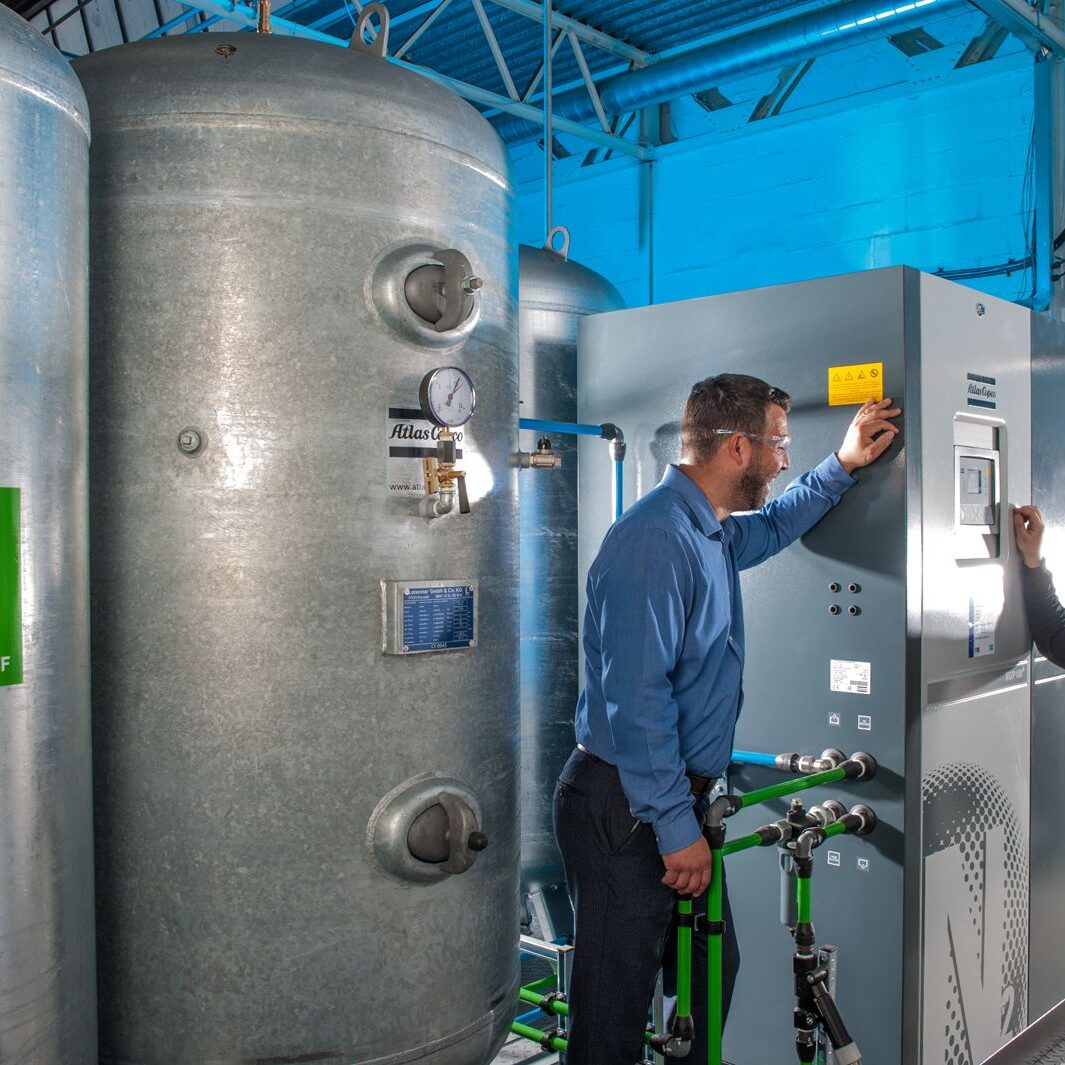
| Compressor Type | Use Case | Typical Application |
|---|---|---|
| GA / GA VSD⁺ | Utility Air | Substations, maintenance workshops, and general plant air |
| ZR / ZT (Oil-Free Screw) | Class 0 Instrument Air | Gas plants, refineries, and nuclear safety systems |
| ZH (Centrifugal) | High-Flow Baseload Air | Petrochemical plants, large-scale power generation |
| ZS / ZE / ZA (Blowers) | Low-Pressure Process Air | EfW plants, wastewater aeration, flue gas treatment |
Smart Controls and IIoT Monitoring
Intelligent control is the new key to efficiency. The Atlas Copco Elektronikon® controller, the multi-compressor ES controllers, and SMARTLINK remote monitoring (IIoT) all work together to deliver complete visibility of system health. This allows you to actively monitor your equipment to prevent unforeseen downtime and constantly optimise energy use.
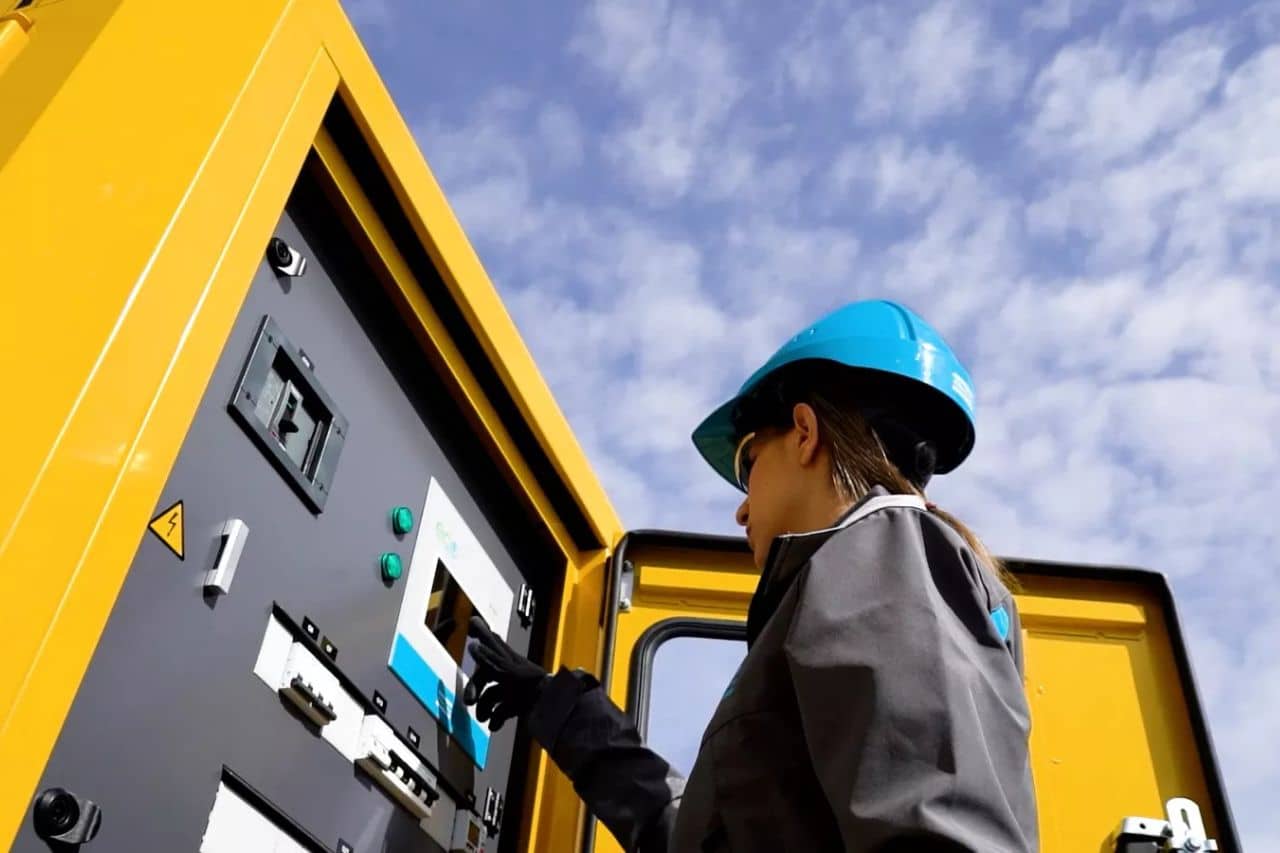
How Compressed Air Powers UK Energy Facilities
Applications for compressed air for energy generation are varied and essential. Selecting the correct type of air compressors for the energy industry is key to success.
- Gas-Fired & CCGT Plants: Compressed air is essential for turbine start-up sequences, purging fuel lines, and operating the extensive network of pneumatic valves and actuators that control the plant.
- Nuclear Power: Systems are designed to the highest safety and reliability standards. Oil-free compressed air is a requirement for safety-critical systems such as control rod drives and emergency shutdown valves.
- Renewable Energy: Wind turbines use compressed air to actuate blade pitch and braking systems. In biomass and EfW plants, it's used for pneumatic conveying of fuel and ash, as well as flue gas treatment.
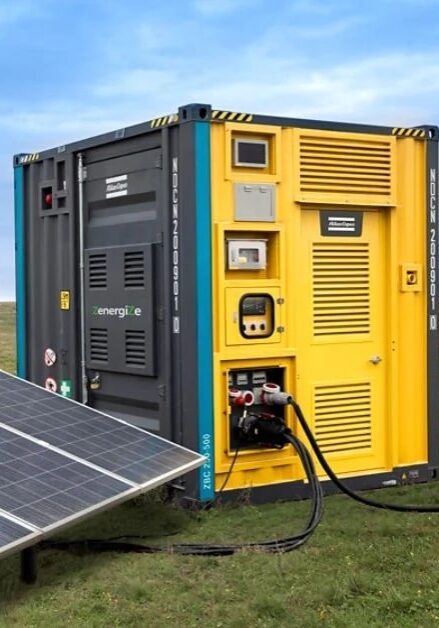
Air Purity & On-Site Gas Generation for Safety & Uptime
The quality of compressed air is as important as its availability. Atmospheric air contains water vapour, particulates, and oil aerosols, which are concentrated during compression. Untreated, this contamination causes corrosion, freezing, and sticking of pneumatic controls, leading directly to plant trips.
A complete air treatment system is essential, using:
- Multi-stage filtration to remove particles and oil aerosols.
- Air dryers (refrigerant or desiccant) to achieve a pressure dew point as low as -70°C.
For plant safety, nitrogen is a critical utility used for inerting hazardous areas and for boiler preservation. On-site generation provides a safer, more reliable, and cost-effective supply than delivered gas. You can find out more by reading our guide on How Does a Nitrogen Generator Work?.
Energy Efficiency: Audits, Leak Detection & Heat Recovery
Did you know that up to 30% of a facility’s compressed air energy is wasted through leaks and poor control? A strategic approach to efficiency delivers substantial savings.
- Find Hidden Savings: A compressed air energy audit can reveal 20–40% in potential kWh savings, building the business case for installing energy-efficient compressors.
- Stop Costly Leaks: A single 3mm leak can cost over £1,200 per year in wasted electricity. Our ultrasonic leak detection equipment quickly locates them without disrupting operations.
- Reclaim Free Energy: Heat recovery systems can reclaim up to 94% of the waste heat generated by a compressor for use in hot water or space heating. Learn more about Energy Recovery for Air Compressors.
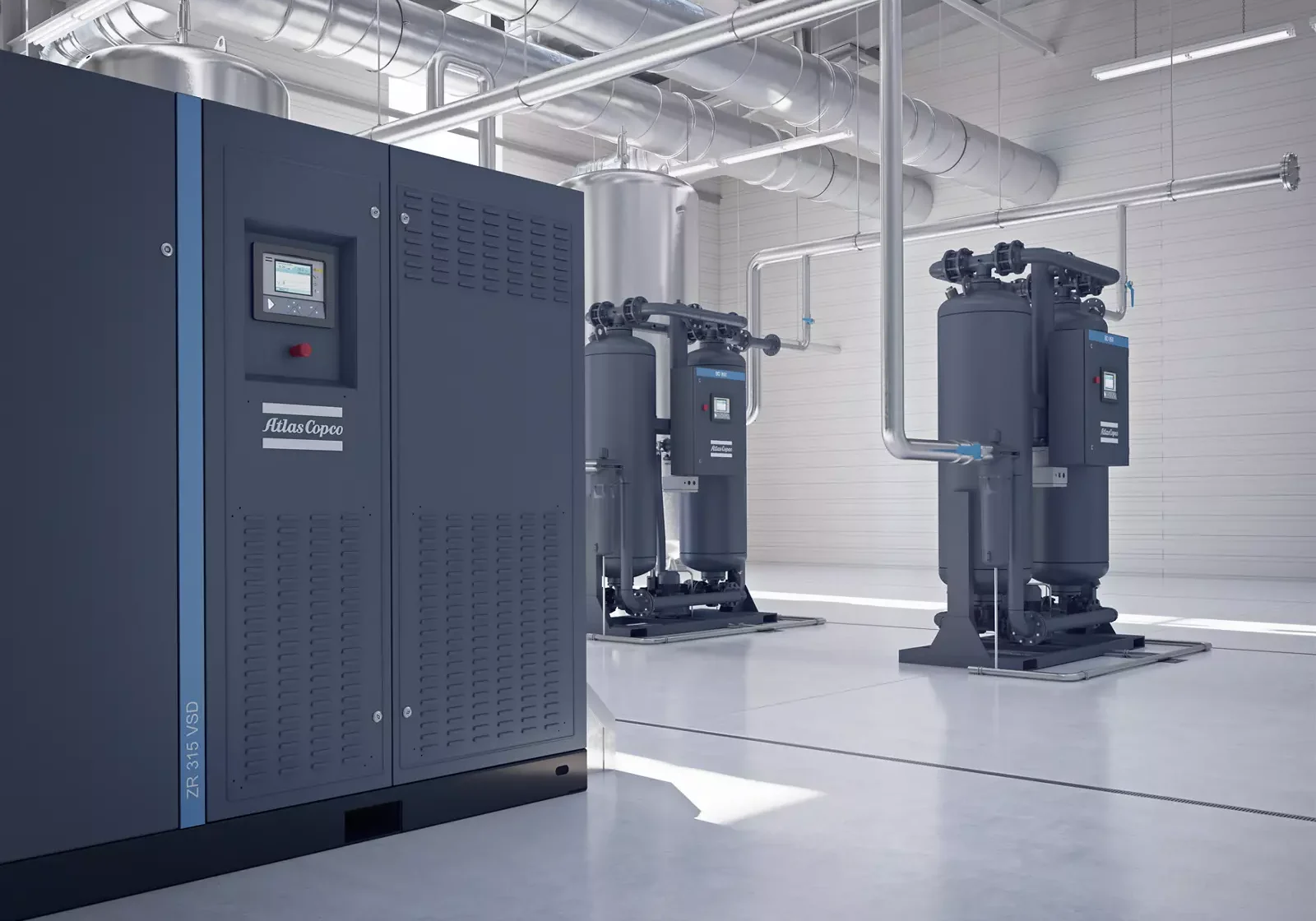
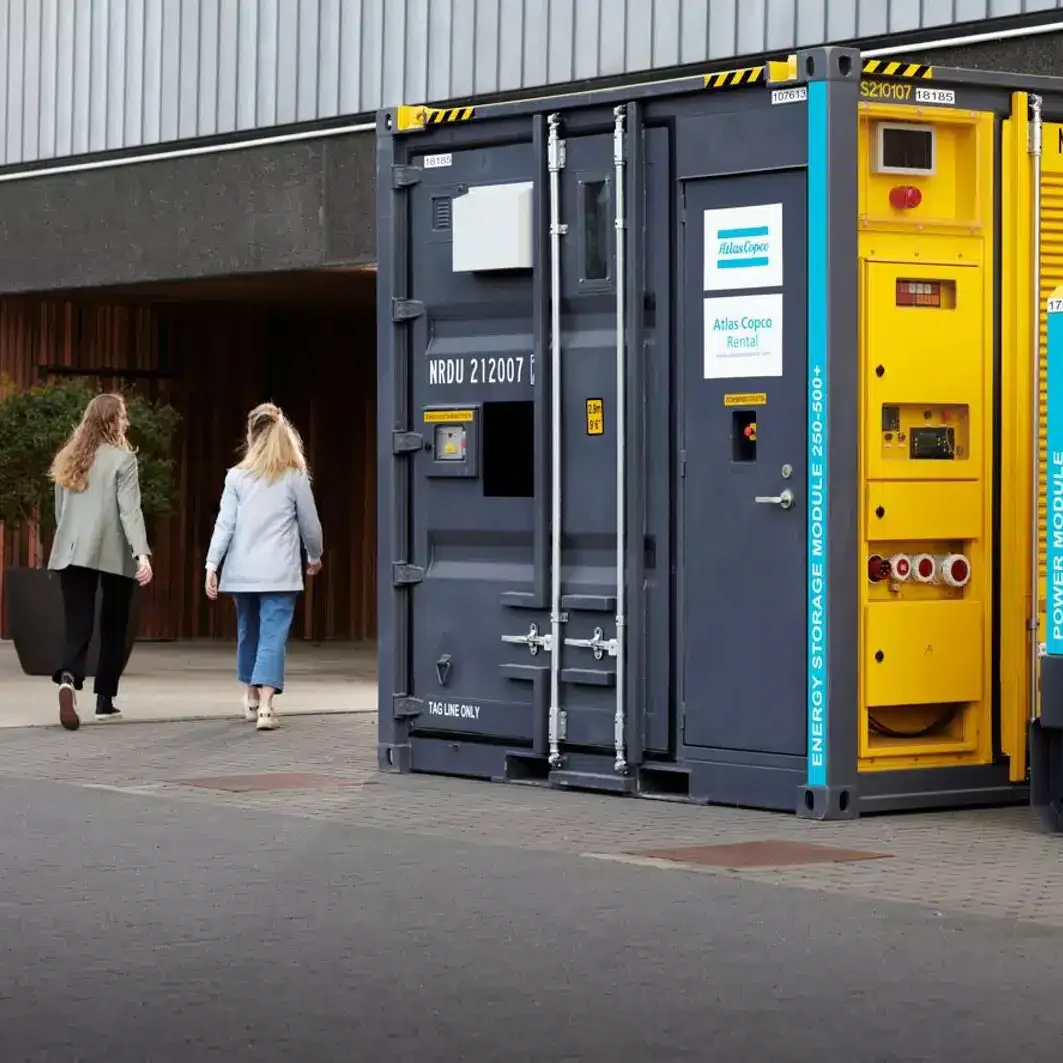
Compliance Made Simple: Meeting UK Regulations
At Anglian Compressors, a branch of Atlas Copco, we believe a specialist partner should help you navigate your statutory obligations and ensure your systems remain fully compliant.
- PSSR 2000: We provide complete PSSR compliance management, acting as the competent body to create the legally required Written Scheme of Examination (WSE) and conduct periodic statutory inspections.
- DSEAR / ATEX (UKEX): For hazardous areas, our experts specify, supply, and install correctly certified ATEX and UKCA 'EX' rated compressor systems.
- ISO 8573-1 Air Quality: We provide certified testing to ensure your instrument and process air meet the required purity standards for process integrity.
- ESOS & SECR: Our comprehensive energy audits provide the data-driven evidence needed for your compliance reports. An audit is the first step toward Understanding ISO 50001 and improving energy management, a key part of The Role of Air Compressors in Sustainable Manufacturing.
Your Expert Partner for Energy Sector Compressed Air
Headquartered in Peterborough, we service the energy sector across the East of England and the Midlands, including all clients' CCGT plants at Spalding and Little Barford, nuclear sites at Sizewell B and C, and all offshore wind throughout the East Anglia coast.
We are a leading Atlas Copco partner, but our engineers have a long history of working across all major brands, so we can deliver a one-stop-shop solution for your entire compressed air portfolio, backed by a local team providing 24/7 emergency support.
Frequently Asked Questions
Class 0 air is the highest level of air purity, containing no oil aerosols or vapours. It is required for sensitive instrumentation and safety-critical systems to prevent contamination and failure.
